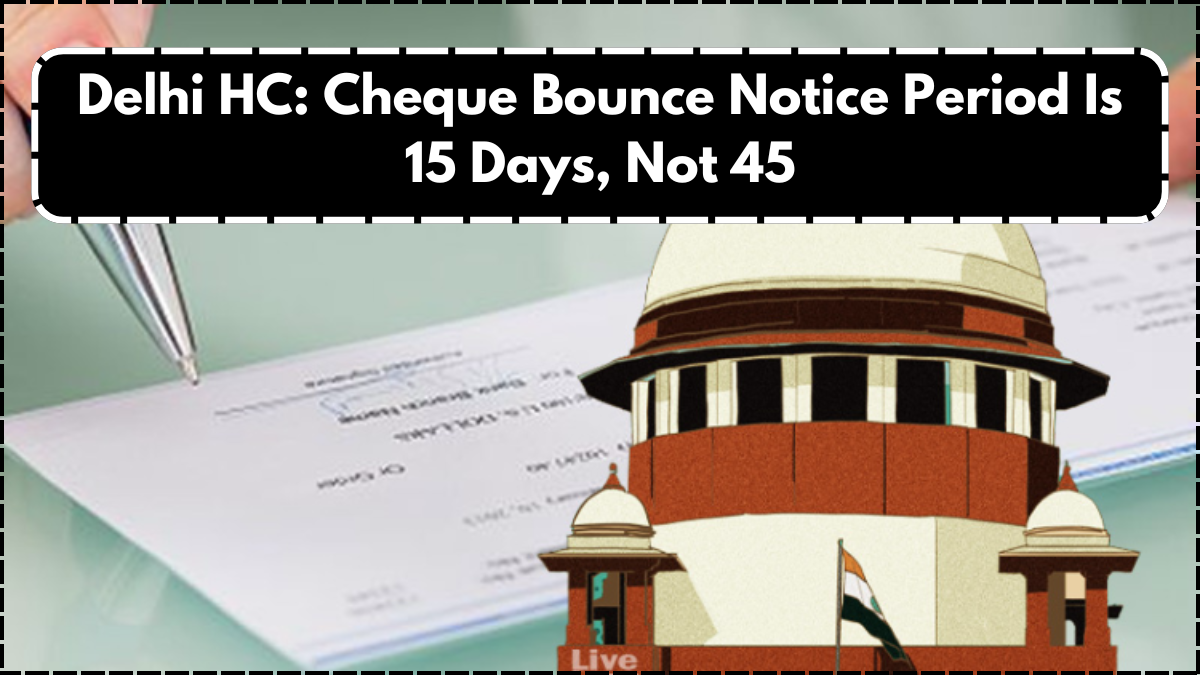The recent judgment by the Delhi High Court has clarified confusion regarding the RBI Cheque Bounce Statutory Period. The court ruled that the Legal Notice Period for cheque dishonor cases is strictly 15 days under the NI Act 15 Days Rule, not 45 days as some parties had argued. This ruling reaffirms the strict interpretation of the Negotiable Instruments Act (NI Act) and provides clarity for both creditors and debtors engaged in cheque-related disputes.

Understanding the RBI Cheque Bounce Statutory Period
The RBI Cheque Bounce Statutory Period is the timeframe within which a payee must send a notice to the drawer after a cheque bounces. Earlier, there were instances where parties assumed a longer period was acceptable, causing disputes and legal uncertainty.
According to the NI Act 15 Days Rule, once a cheque is returned due to insufficient funds or other reasons, the payee must issue a Legal Notice Period within 15 days to demand payment. If the drawer fails to comply, the payee has the right to initiate legal proceedings.
Significance of the NI Act 15 Days Rule
The NI Act 15 Days Rule is crucial because it ensures that cheque bounce disputes are resolved quickly and efficiently. The Delhi High Court reiterated that extending this to 45 days would dilute the purpose of the law.
Key implications of the RBI Cheque Bounce Statutory Period ruling include:
- Creditors must act promptly within 15 days
- Defaulters cannot misuse extended timelines
- Courts will uphold strict compliance with the NI Act
This emphasizes the importance of adhering to the Legal Notice Period and ensures consistency in cheque dishonor cases.
Legal Notice Period Explained
The Legal Notice Period forms the backbone of cheque bounce proceedings. After dishonor, the notice must specify the amount, details of the cheque, and demand for repayment within the statutory period.
Here’s a simplified table explaining the process under the RBI Cheque Bounce Statutory Period:
Step |
Timeline (Days) |
Legal Requirement |
|---|---|---|
Cheque dishonored |
Day 1 |
Bank returns cheque with reason |
Issuing of legal notice |
Within 15 days |
As per NI Act 15 Days Rule |
Response from drawer |
Up to 15 days |
Payment or negotiation possible |
Filing of complaint in court |
After 15 days lapse |
If no payment made after Legal Notice Period |
This structured timeline ensures fairness to both parties while keeping the process time-bound.
Impact on Businesses and Individuals
The Delhi HC judgment has a direct impact on how businesses and individuals handle cheque transactions. By confirming the RBI Cheque Bounce Statutory Period as 15 days, it prevents misuse of delayed notices and maintains trust in the banking system.
For businesses relying on post-dated cheques, strict enforcement of the NI Act 15 Days Rule provides assurance that defaults will be addressed swiftly. Similarly, individuals issuing cheques must remain vigilant to avoid unnecessary legal complications.
Conclusion
The Delhi High Court’s clarification on the RBI Cheque Bounce Statutory Period reinforces the principle that the Legal Notice Period for cheque dishonor cases is strictly governed by the NI Act 15 Days Rule. By upholding the 15-day limit, the court has ensured faster resolution, legal clarity, and stronger accountability in cheque transactions. For businesses and individuals alike, adhering to these rules is essential to avoid legal challenges and maintain financial credibility.
FAQs
What is the RBI Cheque Bounce Statutory Period?
The RBI Cheque Bounce Statutory Period is the timeframe within which a payee must issue a legal notice after a cheque is dishonored.
How many days are allowed under the NI Act 15 Days Rule?
The NI Act 15 Days Rule allows only 15 days to issue a legal notice after the cheque is returned.
What happens if the Legal Notice Period is missed?
If the Legal Notice Period is missed, the payee loses the right to initiate legal proceedings under the NI Act.
Can the notice period be extended to 45 days?
No, the Delhi HC has clarified that the RBI Cheque Bounce Statutory Period is strictly 15 days, not 45.
Why is the NI Act 15 Days Rule important?
It ensures prompt resolution of cheque dishonor disputes, protecting the rights of both creditors and debtors.
Click here to know more.